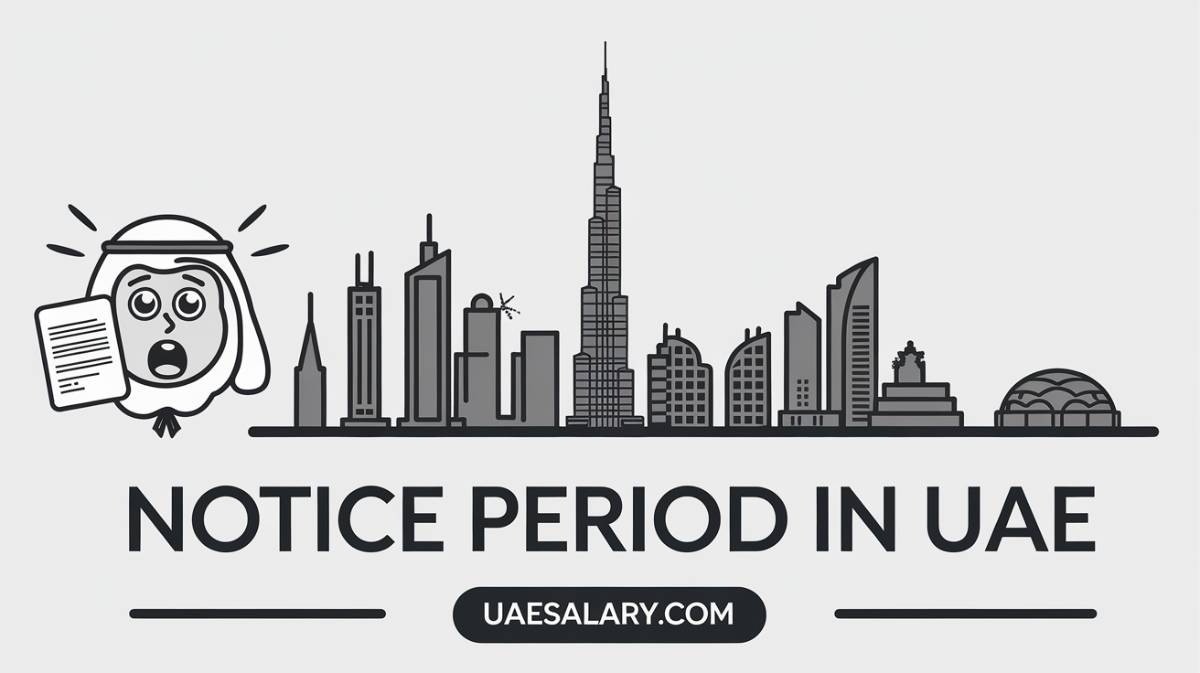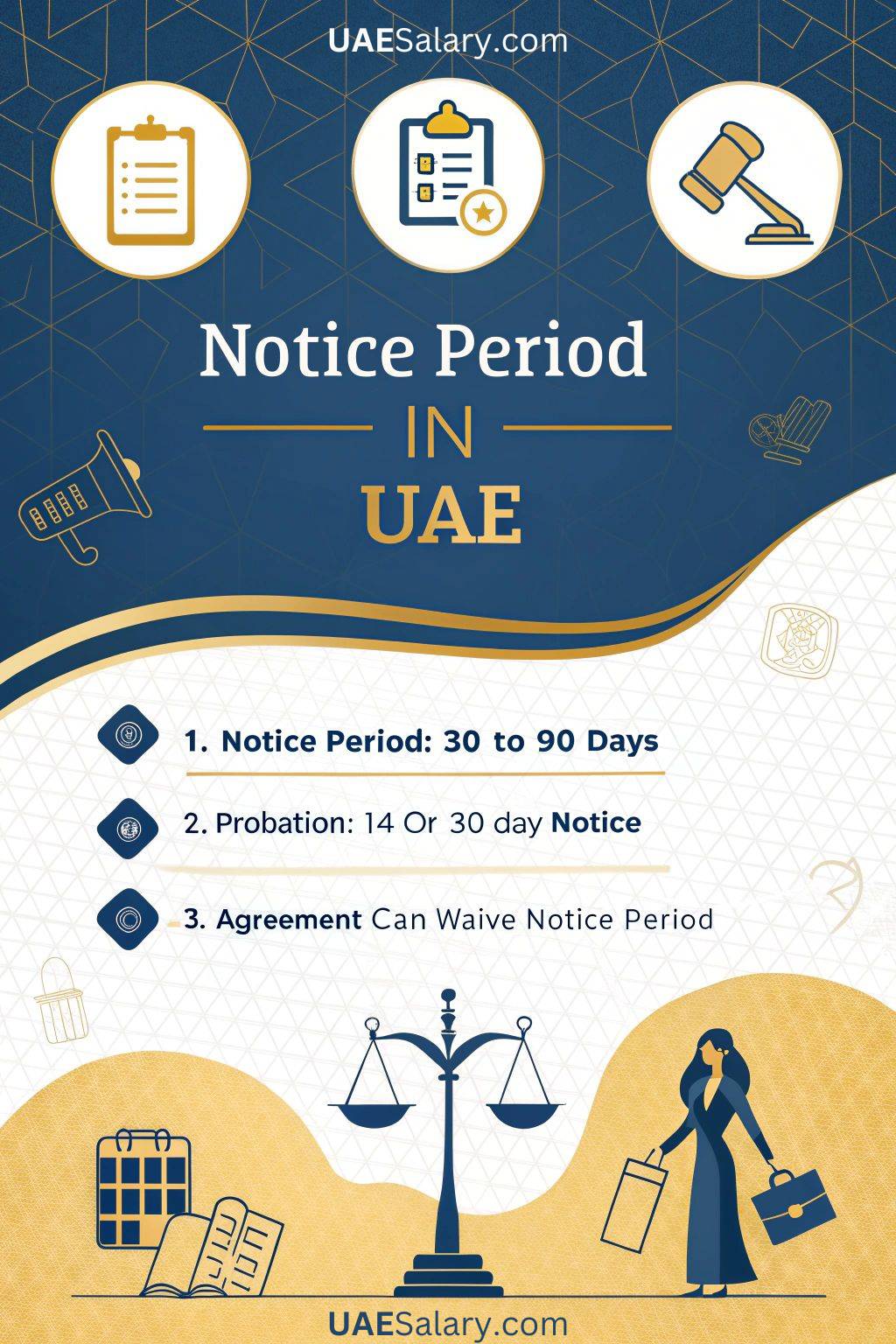
Are you confused about the notice period in UAE when changing jobs? The standard notice period in UAE ranges from 30 to 90 days. This blog explains the UAE labor law on notice periods to help both employees and employers.
Read on to understand your employment contract better.
Key Takeaways
- Notice Period Duration: In the UAE, notice periods range from 30 to 90 days based on the contract type. Unlimited contracts require at least 30 days.
- Probation Notice: During probation, employees must give a 14-day notice if leaving the UAE or 30 days if staying and finding another job.
- Mutual Agreement: Both employers and employees can change or waive the notice period only if they agree in writing.
- Payment and Benefits: Employees receive full wages and benefits throughout the notice period to ensure financial stability.
- Legal Consequences: Breaking notice period rules can lead to fines, legal actions, or compensation claims for both parties.

What is a Notice Period in the UAE?
A notice period in the UAE is the time an employee or employer must give before ending an employment contract. It is a mandatory phase during termination or resignation under UAE labour law.
This period allows both parties to prepare for the transition and comply with employment agreements. Employers and employees use the notice period to ensure a smooth handover and maintain a positive employment relationship.
Respecting the notice period fosters trust and fairness in the workplace.
Standard Notice Periods Under UAE Labor Law
UAE labor laws set notice periods based on your contract type. Whether you have an unlimited or limited contract, it's important to know the requirements.
Notice period for unlimited contracts
For unlimited contracts in the UAE, the minimum notice period is 30 days. Both the employer and employee can agree to extend this period beyond the standard timeframe. During the entire notice period, the employee receives their full salary and benefits, ensuring financial stability.
Employers must provide written notification if they decide to terminate the contract, and both parties must honor the agreed notice period. This agreement helps maintain a smooth transition and fulfills contractual obligations under UAE labor laws.
Notice period for limited contracts
Transitioning from unlimited contracts, limited term contracts in the UAE also require a notice period. For fixed-term contracts, the notice period typically ranges from 30 to 90 days.
The minimum notice period is 30 days, and it cannot exceed 90 days. Both employers and employees must follow the agreed notice period unless they mutually decide to waive it. If either party ends the contract early without proper notice, they may face penalties or need to pay compensation under UAE labor laws.
Notice Period During Probation
During the probation period, both employees and employers in the UAE must adhere to specific notice periods. If an employee decides to resign while still in probation and plans to leave the UAE, they are required to give a 14-day notice.
However, if the employee intends to transfer to another job within the UAE, a longer notice period of 30 days is necessary. On the other hand, employers have the right to terminate the employment during probation by providing a 14-day notice.
These rules ensure that both parties have adequate time to make necessary arrangements, maintaining fairness in the employment relationship.
Understanding these notice period requirements is crucial for a smooth transition. Next, let's explore whether the notice period can be changed or waived.
Can the Notice Period Be Changed or Waived?
Notice periods can change or be waived only if both the employer and employee agree in writing. This mutual agreement must clearly state the new terms. For example, an employer and employee might agree to shorten the notice period from 60 to 30 days.
Without this written consent, the standard notice periods under UAE labor law apply.
Sometimes, a notice period isn't needed. If the employer breaks the contract, the employee can resign immediately without serving the notice. Similarly, under Article 121, employers may terminate an employee without notice for valid reasons.
Both parties must follow these rules to avoid legal issues.
A written agreement ensures both sides understand the new terms clearly.
Resignation and Notice Period Requirements
When an employee decides to resign, UAE labor laws require a written notice period. Both the employee and employer have specific responsibilities during this time.
Employee obligations during the notice period
During the notice period, employees have important responsibilities. Following these helps ensure a smooth transition for everyone.
- Complete Your Duties: Perform all job tasks until the notice period ends. Maintain your usual work standards and meet deadlines.
- Stick to Work Hours: Follow the normal working hours in your contract. Be punctual and attend work regularly during the notice period.
- Stay Professional: Keep a positive attitude at work. Avoid negative comments about the company or your colleagues.
- Assist with Handover: Help transfer your tasks to others. Provide clear instructions and any necessary documents.
- Participate in Exit Interviews: Share your feedback during exit interviews. This helps improve the workplace for everyone.
- Receive Full Wages and Benefits: Get your full worker's wage during the notice period. Your last wage will cover the entire notice duration.
- Respect Confidentiality: Keep company information private after leaving. Follow any non-disclosure agreements you signed.
Employer responsibilities during the notice period
Employers in the UAE must follow specific duties during the notice period. These actions help ensure a fair and smooth transition for everyone involved.
- Specify Notice Period Duration: Clearly state the notice period in the employment contract. This applies to both unlimited term contracts and fixed term contracts.
- Conduct Exit Interviews: Meet with the employee to gather feedback about their experience. Exit interviews provide valuable insights for improving workplace practices.
- Allow Job Searching Time: Permit employees to take one day off per week for job searching. Inform them at least three days in advance to accommodate their needs.
- Honor Wages and Benefits: Continue paying wages and providing benefits until the last working day. Ensure all agreements are fulfilled as per the contract.
- Manage Transition Process: Handle the handover of duties smoothly. Ensure that all responsibilities are transferred properly to avoid disruptions.
- Provide Formal Notification: Give official notice of termination in writing. Use proper channels to communicate the end of employment clearly.
Next, let's explore what happens when termination occurs without notice.
Termination Without Notice
Ending a job without notice can hurt both sides. Employers and workers may face fines if they do not follow the law.
Termination by the employer
Employers may terminate a worker for valid reasons under UAE labour laws. Using a false identity or nationality is unacceptable. Submitting fake documents or serious safety violations also justify termination.
Gross misconduct, like theft or fraud, leads to immediate termination. Violating confidentiality agreements is another serious offense employers cannot overlook.
Fair termination practices protect both employers and employees.
After deciding to terminate, employers must follow the notice period agreed in the job contract. They have to pay the worker's salary during this time.
If employers fail to observe the notice period or terminate without valid reasons, they may face legal consequences.
Adhering to UAE labour regulations helps avoid penalties and ensures a fair process.
Termination by the employee
When an employee decides to resign, they must follow the UAE notice period in their contract. Serving the full notice period helps ensure a smooth transition for both parties.
During this time, the employee should continue performing their duties and may assist in training a replacement.
The employer must pay the employee's wages throughout the notice period.
If the employee leaves early without mutual agreement, they might face penalties or legal action for breaching the employment contract.
Submitting a formal resignation letter starts the notice period. Employees should understand their rights and obligations under UAE employment laws to avoid issues.
If both the employee and employer agree, the notice period can be waived.
Failing to adhere to the notice period can lead to legal repercussions and compensation claims, so it's important to handle resignations properly.
Legal Consequences of Notice Period Violations
If employers ignore notice period laws, they might face fines or court actions. Employees who skip their notice period could also be penalized by the authorities.
Penalties for employers
Employers who breach the employment contract by terminating without the proper notice period can face serious penalties. The Ministry of Human Resources and Emiratisation (MoHRE) may launch investigations into wrongful termination cases.
If an employer does not honor wages and benefits until the employee’s last day, they can be fined or required to compensate the worker.
Arbitrary dismissal is prohibited, and employers must follow the legal process to avoid penalties.
This ensures that both parties respect the terms of the employment contract and maintain fair workplace practices.
Penalties for employees
Employees who resign without serving the required notice period may face financial penalties. Employers can seek compensation for the unserved notice period, which means employees might have to pay wages equivalent to that time.
Under Article 119 for limited-term contracts, breaking the notice period obligations can lead to legal action. If the matter goes to court, a final judgment may require the employee to cover the employer’s losses.
Moreover, breaching the notice period can harm the employee’s reputation and future job prospects.
Failure to observe the notice period can also result in the loss of certain benefits. Employers might withhold final wages until the issue is resolved.
In some cases, employees may need to compensate for any substantial material loss caused by their early departure.
It is important for employees to understand these penalties to avoid unnecessary legal and financial troubles.
How Payments Work During the Notice Period
During the notice period, workers receive their full wages and benefits. This ensures financial stability until the last working day.
If an employee resigns or the employer terminates the contract immediately, payment adjustments may occur.
The final salary is based on the last wage paid during the notice period.
Employers must honor their obligations by providing timely payments. Benefits such as health insurance and allowances continue throughout the notice period.
If the contract ends before the notice period is complete, both parties must follow labor laws to handle payments correctly.
This protects the rights of both the employee and the employer.
Best Practices for Managing Notice Period Transitions
A well-managed notice period helps everyone stay on track. Employers and employees can follow simple steps to ensure a smooth transition.
For employers
For employers, handling notice periods properly keeps everything on track. Follow these best practices:
- Define Notice Periods Clearly: State the notice period duration in the employment contract. This removes confusion for both parties.
- Conduct Exit Interviews: Hold exit interviews to gather feedback. Use this information to improve workplace conditions and employee retention.
- Honor Wages and Benefits: Pay all agreed salaries and benefits until the employee's last working day. This shows respect and fairness.
- Allow Time for Job Searching: Let employees take time off to look for new jobs during the notice period. This helps them transition smoothly.
- Manage Transition of Duties: Plan how the employee's tasks will be handed over. This ensures work continues without interruptions.
- Comply with Labor Laws: Follow UAE labor legislation regarding notice periods and termination processes. This avoids legal issues.
- Respect Confidentiality: Protect confidential information even after the employee leaves. This maintains business integrity.
- Provide Support: Offer assistance, such as references or career advice. This fosters positive relationships.
- Prepare Documentation: Ensure all termination paperwork is complete and accurate. This makes the process clear for both sides.
- Maintain Professionalism: Treat departing employees with respect. This upholds your company's reputation.
For employees
When you decide to resign, following best practices helps make the transition smooth. It also protects your rights and keeps your reputation strong.
- Submit a Resignation Letter: Write a clear and formal resignation letter. State your last working day according to your notice period allowance.
- Complete Your Duties: Finish all your tasks before you leave. Stick to your work hours until the end of the notice period.
- Assist with Handover: Help train your replacement or hand over your responsibilities. This shows professionalism and respect.
- Stay Professional: Keep a positive attitude at work. Avoid any conflicts or negative comments about the company.
- Communicate Clearly: Talk openly with your employer about your resignation. Discuss any concerns or questions you have.
- Understand Your Rights: Know your employee rights regarding payments and benefits during the notice period. Ensure you receive your wage received on time.
- Avoid Breaching the Contract: Do not leave before your notice period ends unless you have mutual agreement with your employer.
- Plan Financial Stability: Make sure you have financial plans in place during the notice period. This helps you manage any changes smoothly.
- Seek Legal Advice if Needed: If there are any issues, contact a legal representative to understand your options and rights.
Following these steps helps you leave your job on good terms and prepares you for your next opportunity.
Conclusion
Knowing your notice period helps both workers and bosses in the UAE. It makes leaving a job easier and fair for everyone. Following the rules can prevent problems later on.
Whether you’re starting a new job or moving on, keep these guidelines in mind. A smooth transition benefits everyone involved.
Frequently Asked Questions
1. What is the notice period during the probationary period in the UAE?
During the probationary period, either the employer or the worker can terminate the employment contract without notice. This allows both parties to decide if they want to continue the relationship without penalties.
2. What happens if there is a breach of the employment contract in the UAE?
If either the employer fails to meet their obligations or the employee does not observe their duties, it can lead to a material breach of the employment contract. This may result in early termination compensation or damages as per labor legislation.
3. Can an employee resign without serving the notice period in the UAE?
Yes, an employee can mutually agree with the employer to terminate the contract without serving the notice period. However, if the employee resigns without agreement, they might face a freedom-restricting penalty or be required to compensate the employer.
4. What compensation is required for early termination due to economic or exceptional reasons?
If termination is based on economic or exceptional reasons, the terminating party must observe the remaining period of the notice. The employer may retain certain obligations, and compensation might be required as per the final court judgment.
5. How does the UAE handle wrongful terminations and unfair dismissals?
Wrongful terminations and unfair dismissals are addressed under labor and employment laws in the UAE. Employees can file grievances, and if proven, the court may award damages or reinstate the worker to ensure safe working conditions and adherence to the contract of employment.
6. What are the rules if an employer dies or there is a worker's death during the contract?
In cases of the employer’s death or the worker’s death, the employment contract typically expires. Additionally, full permanent inability or permanent inability due to illness may lead to termination without notice, ensuring that the parties involved are fairly treated under the labor market regulations.
